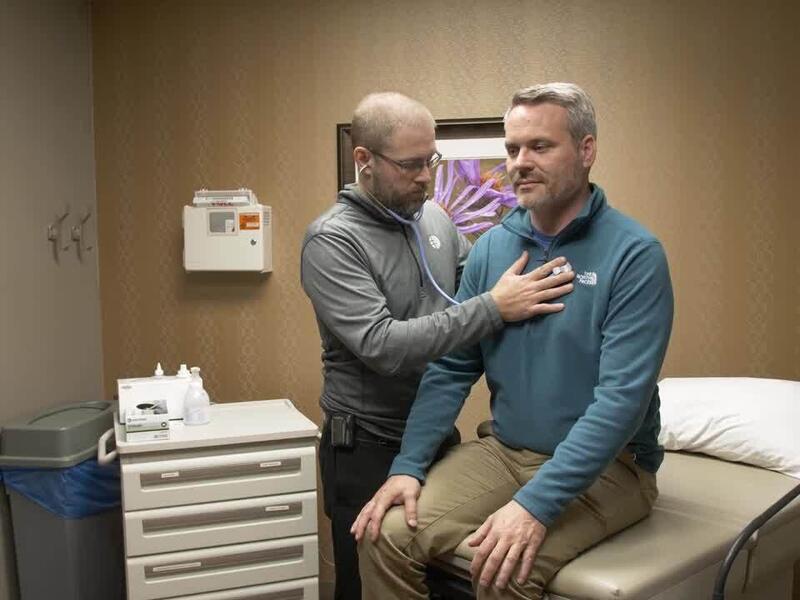Have you put off a health screening or simply forgotten to schedule it? Many have. Consider this your reminder to get back on track.
The following health screenings are crucial to establishing and maintaining good health and for detecting disease at an early stage.
Colorectal cancer screening
With early detection, 9 out of 10 people have no evidence of colorectal cancer five years later. Screenings can also find noncancerous colon polyps or colon cancer early, when they can be easily removed or cured. Colorectal cancer is the second-leading cancer killer in the United States.
Patients should be screened for colorectal cancer starting at age 45 – stool tests every 1-3 years or colonoscopy every 10 years, or more often as determined by their physician. The risk of getting colorectal cancer increases as you age.
Sanford Health offers these screenings:
- Colonoscopy: The most accurate and efficient screening option available is a colonoscopy. During this procedure, a gastroenterologist uses a lighted scope with a camera to look at the colon and rectum to check for abnormal tissues and cells. If any growths, or ‘polyps’ are found, they can be removed during the procedure before potentially developing into cancer (may include a biopsy if needed). Colonoscopies are a covered procedure for most insurance companies for adults ages 45 and older and should be done every 10 years.
- Stool sample. A stool sample, such as FIT (fecal immunochemical test), is an at-home screening test where you collect a sample and return the test kit to the lab or mail it back. The stool is checked by a specialist for blood (not seen by the naked eye). If your test is normal, it is recommended that it is done every year. If your test is not normal, you will need a colonoscopy.
“People are thinking, ‘Well, I’ll do it next year,’” said Dr. Jason Myrmoe, a primary care physician with Sanford. “Men and women will just follow it up with the next visit. So rather than a month’s delay it could potentially be six months, or a year delay. That’s much longer for that cancer to spread. Then it becomes much more difficult to treat.”
Cervical cancer screening
Cervical cancer can be preventable. In addition to screening, HPV vaccination is also encouraged for most patients between the ages of 9 and 12. There’s nothing right now that can prevent ovarian cancer, but women who make some lifestyle choices can reduce their risk.
Women should start getting screened at age 21. There are two types of cervical cancer screenings available, a Pap smear also known as a Pap test and an HPV test. Depending on your age and other risk factors your provider may have different recommendations for screening options.
“We screen for cancer because we want to identify it and catch it before it becomes a bigger problem than it already is,” Dr. Myrmoe said.
Disease-specific screening
Diabetes is a common example of a chronic disease that needs to be monitored. Are you getting your blood work? And getting your foot exams and your eyes checked on a regular basis?
If time or distance is an issue, video visits can be an effective option. They can aid in many cases for diabetes and other chronic conditions like high blood pressure. After an initial visit in person, providers can often monitor patients virtually.
“After you’ve seen them in person, patients can do a quick video visit to talk about insulin management and adjustments and following up after we do the new medication,” Dr. Myrmoe said.
Immunizations
It’s not a screening exactly, but immunizations are a vital part of a preventive health plan, particularly for children. Postponing vaccinations could lead to outbreaks of preventable diseases should too many families put off care.
The vaccination process is often a partner with scheduled wellness visits. Without the visits, vaccines can fall behind.
“We definitely want families to come in,” said Dr. Laura Whittington, a Sanford Health pediatrician. “We want to stay up-to-date on vaccines and we want to make sure that they don’t have chronic health issues, such as high cholesterol or high blood pressure.”
Mammograms
Sanford Health recommends annual mammograms starting at age 40. An annual screening can find breast cancer at its earliest and most treatable stage.
Breast radiologists, certified mammographers and genetic counselors at Sanford all work with you to create a personalized prevention plan based on your genetics and risk factors.
Behavioral health screening
Taking care of your mental health is just as important as your physical health.
When you’re screened for behavioral health, your health care provider will ask questions about your feelings, mood, and other symptoms. Screening tests for kids and teens have different questions. Parents may also be asked about their children.
“The longer we let things go on, the more effect they have on our body and our social health,” said Dr. Jerrod Spring, a psychiatrist at Sanford Behavioral Health.
“If we can get treatment sooner rather than later, the odds of getting into a full recovery are much higher than delayed care. … If you had pneumonia and you didn’t go to the hospital and get antibiotics and get that treated, you’re more likely to have a bad outcome. The same thing would stand for depression or anxiety.”
Learn more
- Colorectal cancer screening: Check out the options
- How to choose a primary care physician in four steps
- Choosing the right behavioral health care provider
…
Posted In Behavioral Health, Bemidji, Cancer Screenings, Family Medicine, Fargo, Healthy Living, Imaging, Immunizations, Internal Medicine, Sioux Falls, Virtual Care
